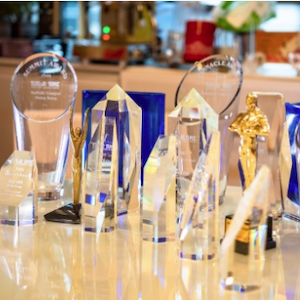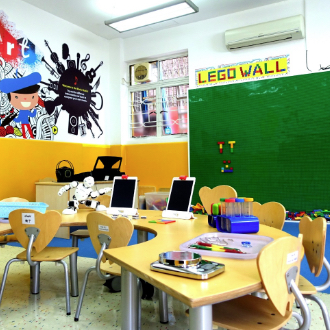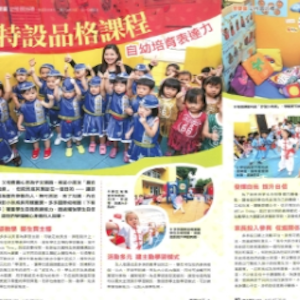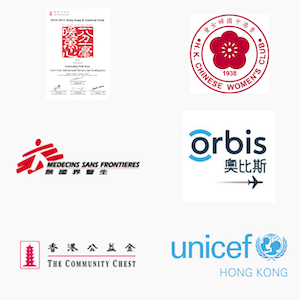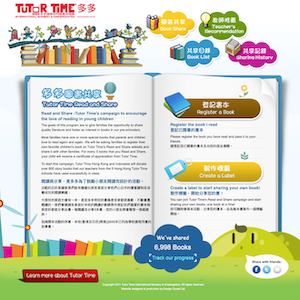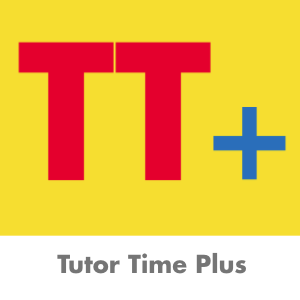每个孩子都是不一样的。每个孩子都是独一无二的。
在多多国际幼儿园暨幼稚园,每个孩子透过运用他们独有的技能和兴趣,不断成长,建立自尊心和发展想像力,从而发挥自己的优势。从多多毕业的学生作为一个全面发展的个体,他们拥有克服挑战的能力,并在各个方面都取得成就。
除了他们的成长发展和教育之外,保障孩子的安全是我们的首要任务,而沟通是关键所在。 定期更新(包括多张照片)孩子的经验,您会很高兴更了解自己的孩子。

每个孩子都是不一样的。每个孩子都是独一无二的。
在多多国际幼儿园暨幼稚园,每个孩子透过运用他们独有的技能和兴趣,不断成长,建立自尊心和发展想像力,从而发挥自己的优势。从多多毕业的学生作为一个全面发展的个体,他们拥有克服挑战的能力,并在各个方面都取得成就。
除了他们的成长发展和教育之外,保障孩子的安全是我们的首要任务,而沟通是关键所在。 定期更新(包括多张照片)孩子的经验,您会很高兴更了解自己的孩子。
多多国际幼儿园暨幼稚园于1988年在佛罗里达州成立。于2001年,我们成为首间在香港由美国引入全面而集中的美式英语及普通话的双语幼儿园暨幼稚园。我们致力通过不断创新课程、设施和团队,不断将幼儿教育推向新的境界。我们在学生安全、家校沟通、科技的有效使用等方面树立了基准,并且将继续努力成为幼儿教育的领导者

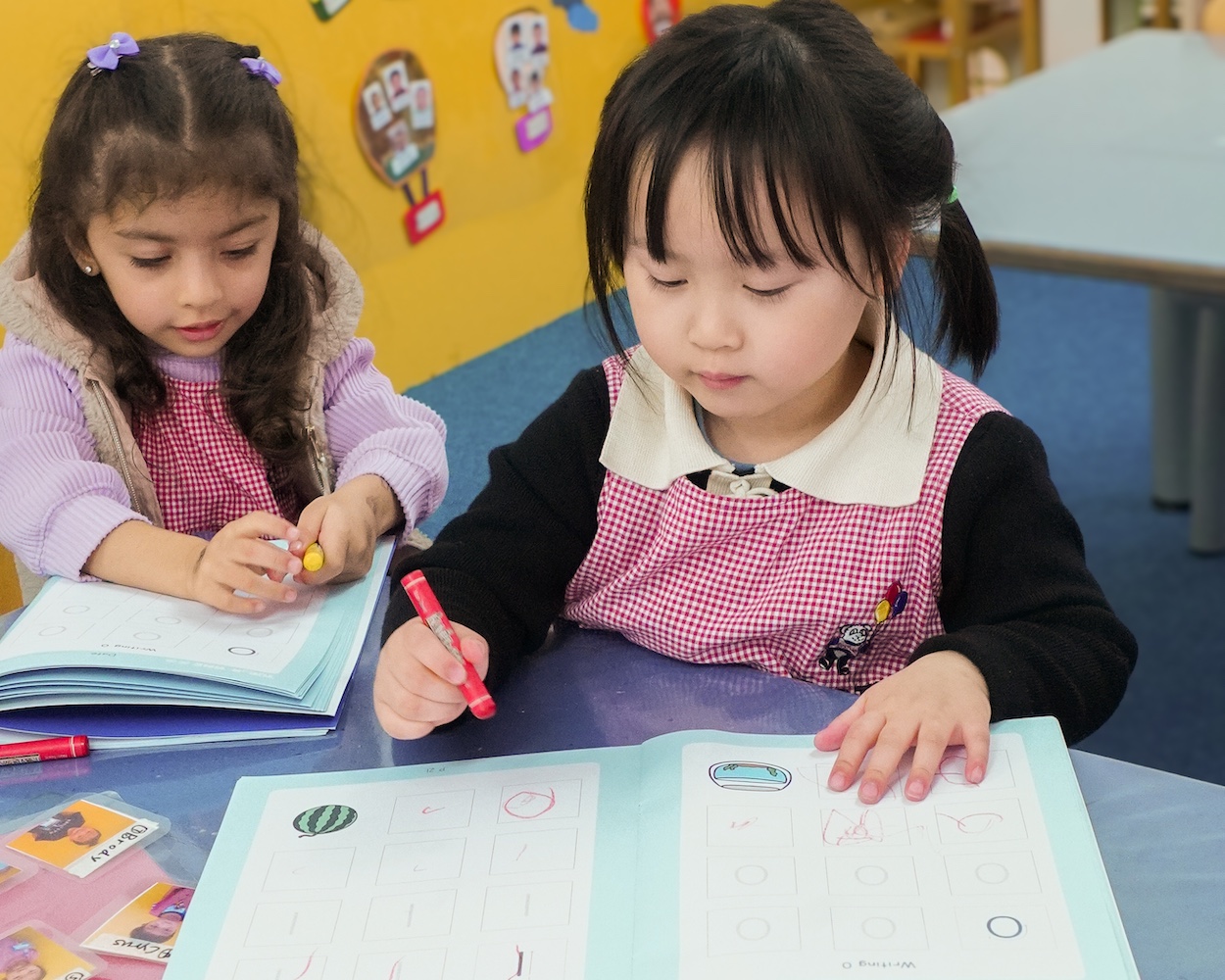
联系我们
Copyright 2024 Tutor Time International Pre-school. All rights reserved.
How to plan, set goals, and interact with others and with the environment.
Young minds hold distinct intelligences and developing talents within.
Educational tools shape children's minds as they engage in learning within the classroom environment.
Within this space, we create opportunities for children to cultivate their individual intellects through interactive learning experiences.
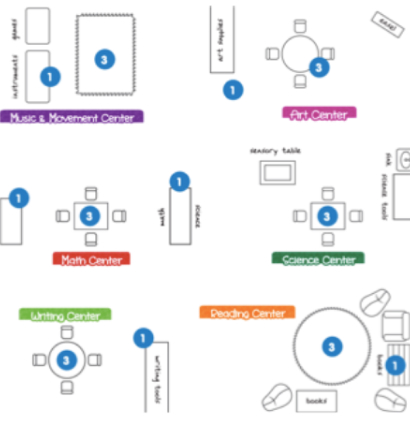
How to express ideas and feelings through music, movement, visual arts, and drama.
We educate our students on expressing creativity through art, emphasizing that art encompasses more than just painting.
Art plays a crucial role in enhancing various motor skills such as gross motor skills, fine motor skills, and hand-eye coordination.
Additionally, creative arts aids children in enhancing their communication and vocabulary skills by encouraging discussions about their activities, colors, and shapes.
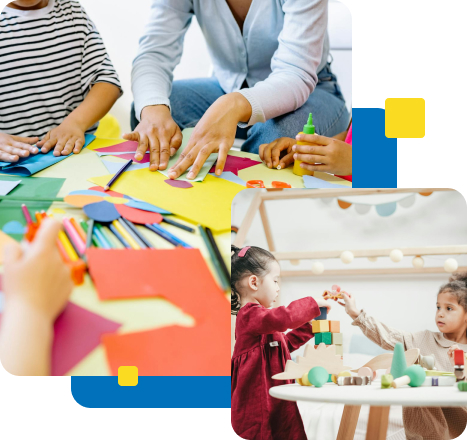
How to use expressive and receptive vocabulary and to use conversation skills and vocabulary to communicate effectively.
Mastering multiple languages from a young age offers more than just linguistic advantages. It can also improve essential cognitive abilities, such as reasoning skills.
Our immersive English/Mandarin bilingual program provides students with a dynamic and motivating bilingual setting to excel in both languages as if they were native speakers.
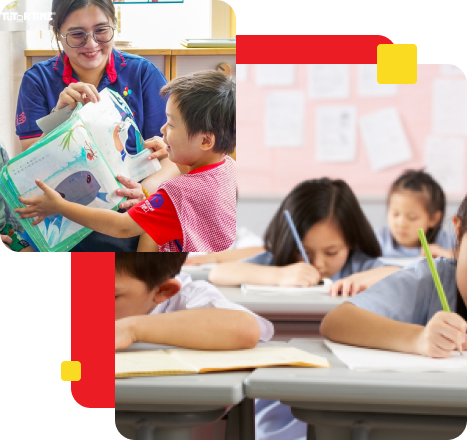
How to demonstrate phonological awareness, alphabet knowledge, reading, and writing skills.
The literacy developmental scale evaluates and enhances a child's skills in phonological awareness, alphabet knowledge, reading, and writing.
It starts with foundational tasks like identifying sounds and recognizing letters, progresses to decoding and comprehending text, and culminates in the ability to write words and sentences effectively.
This comprehensive approach ensures robust literacy development, preparing children for future academic success.
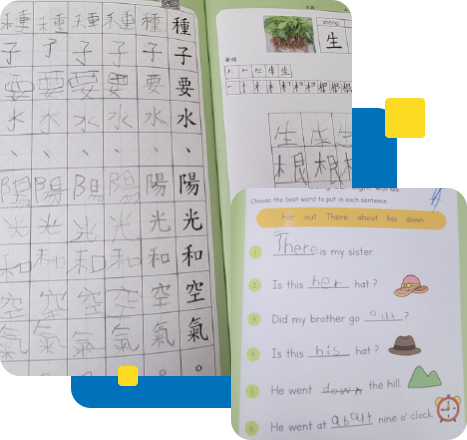
How to demonstrate phonological awareness, alphabet knowledge, reading, and writing skills.
Our Logic and Reasoning developmental scale is designed to cultivate critical thinking and problem-solving skills in young learners.
Through engaging activities and challenges, we encourage children to explore patterns, relationships, and logical sequences, building a strong foundation for analytical thinking that supports their overall cognitive development and prepares them for complex reasoning tasks in their future educational endeavors.
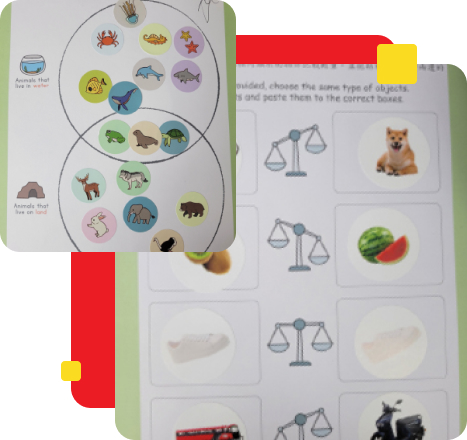
How to understand numbers, patterns, sorting, and ordering, as well as how to use numbers to add, subtract, measure, and graph.
Our Logic and Reasoning developmental scale is designed to cultivate critical thinking and problem-solving skills in young learners.
Through engaging activities and challenges, we encourage children to explore patterns, relationships, and logical sequences, building a strong foundation for analytical thinking that supports their overall cognitive development and prepares them for complex reasoning tasks in their future educational endeavors.
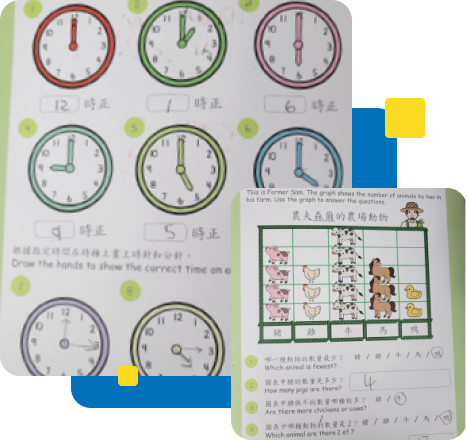
How to understand the natural and physical world, as well as how to observe, describe, predict, and gather data.
Nature provides countless opportunities for discovery, creativity, problem-solving, and STEM education. Interacting with natural environments allows children to learn by doing and experiment with ideas. In nature, children think, question, and make hypotheses — thereby developing inquisitive minds.
Science education activities provide children with opportunities to develop and practice many different skills and attributes. These include communication skills, collaborative skills, team working and perseverance, as well as analytical, reasoning and problem-solving skills.
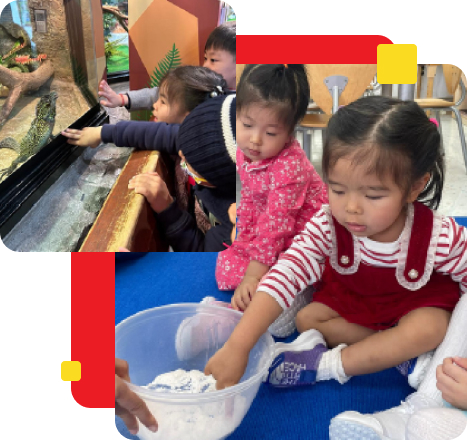
How to understand themselves, their families, communities, and their world.
Understanding our community offers valuable lessons for children. Communities foster a sense of connection to a specific time, location, and way of life. They also offer a chance to develop communication skills and build relationships with a diverse range of individuals, beyond just their peers.
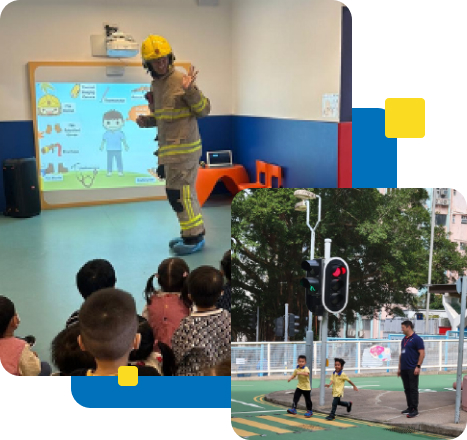
How to build fine and gross motor skills and to understand health and nutrition.
Physical development is a vital milestone in every student's growth here at Tutor Time. Both our outdoor and indoor time allows our students to foster independence and develop social-emotional skills through collaboration and teamwork. Moreover, physical development promotes healthy mental and physical advancement in all our students.
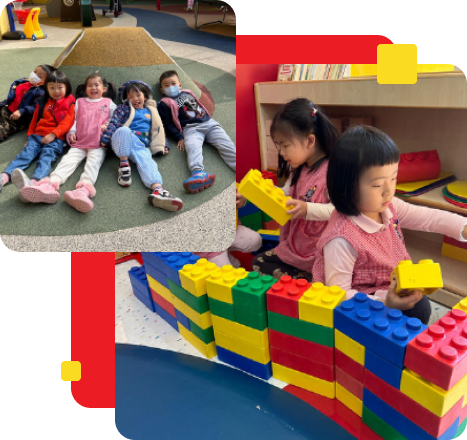
How to develop self-awareness and how to show respect and empathy for others.
In our classrooms we have “Turn Taking Bands” at every station. Taking turns is a crucial social skill that aids children in understanding how to share and collaborate with others. This skill fosters the development of patience, empathy, and self-control, while teaching children to respect the rights and feelings of their peers.
Conflict Resolution
In our classrooms, we provide step-by-step guidance on resolving conflicts. For our students, conflict resolution begins with assisting them in calming down. From the acknowledgement of our emotions, to taking deep breaths before reaching a solution this step by step guide equips our students with an important lifelong skill.
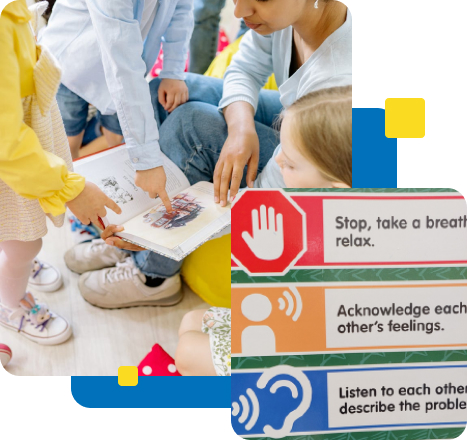
How to express ideas and feelings through music, movement, visual arts, and drama.
We educate our students on expressing creativity through art, emphasizing that art encompasses more than just painting.
Art plays a crucial role in enhancing various motor skills such as gross motor skills, fine motor skills, and hand-eye coordination.
Additionally, creative arts aids children in enhancing their communication and vocabulary skills by encouraging discussions about their activities, colors, and shapes.

How to use expressive and receptive vocabulary and to use conversation skills and vocabulary to communicate effectively.
Mastering multiple languages from a young age offers more than just linguistic advantages. It can also improve essential cognitive abilities, such as reasoning skills.
Our immersive English/Mandarin bilingual program provides students with a dynamic and motivating bilingual setting to excel in both languages as if they were native speakers.

How to demonstrate phonological awareness, alphabet knowledge, reading, and writing skills.
The literacy developmental scale evaluates and enhances a child's skills in phonological awareness, alphabet knowledge, reading, and writing.
It starts with foundational tasks like identifying sounds and recognizing letters, progresses to decoding and comprehending text, and culminates in the ability to write words and sentences effectively.
This comprehensive approach ensures robust literacy development, preparing children for future academic success.

How to demonstrate phonological awareness, alphabet knowledge, reading, and writing skills.
Our Logic and Reasoning developmental scale is designed to cultivate critical thinking and problem-solving skills in young learners.
Through engaging activities and challenges, we encourage children to explore patterns, relationships, and logical sequences, building a strong foundation for analytical thinking that supports their overall cognitive development and prepares them for complex reasoning tasks in their future educational endeavors.

How to understand numbers, patterns, sorting, and ordering, as well as how to use numbers to add, subtract, measure, and graph.
Our Logic and Reasoning developmental scale is designed to cultivate critical thinking and problem-solving skills in young learners.
Through engaging activities and challenges, we encourage children to explore patterns, relationships, and logical sequences, building a strong foundation for analytical thinking that supports their overall cognitive development and prepares them for complex reasoning tasks in their future educational endeavors.

How to understand the natural and physical world, as well as how to observe, describe, predict, and gather data.
Nature provides countless opportunities for discovery, creativity, problem-solving, and STEM education. Interacting with natural environments allows children to learn by doing and experiment with ideas. In nature, children think, question, and make hypotheses — thereby developing inquisitive minds.
Science education activities provide children with opportunities to develop and practice many different skills and attributes. These include communication skills, collaborative skills, team working and perseverance, as well as analytical, reasoning and problem-solving skills.

How to understand themselves, their families, communities, and their world.
Understanding our community offers valuable lessons for children. Communities foster a sense of connection to a specific time, location, and way of life. They also offer a chance to develop communication skills and build relationships with a diverse range of individuals, beyond just their peers.

How to build fine and gross motor skills and to understand health and nutrition.
Physical development is a vital milestone in every student's growth here at Tutor Time. Both our outdoor and indoor time allows our students to foster independence and develop social-emotional skills through collaboration and teamwork. Moreover, physical development promotes healthy mental and physical advancement in all our students.

How to develop self-awareness and how to show respect and empathy for others.
In our classrooms we have “Turn Taking Bands” at every station. Taking turns is a crucial social skill that aids children in understanding how to share and collaborate with others. This skill fosters the development of patience, empathy, and self-control, while teaching children to respect the rights and feelings of their peers.
Conflict Resolution
In our classrooms, we provide step-by-step guidance on resolving conflicts. For our students, conflict resolution begins with assisting them in calming down. From the acknowledgement of our emotions, to taking deep breaths before reaching a solution this step by step guide equips our students with an important lifelong skill.

How to plan, set goals, and interact with others and with the environment.
Young minds hold distinct intelligences and developing talents within.
Educational tools shape children's minds as they engage in learning within the classroom environment.
Within this space, we create opportunities for children to cultivate their individual intellects through interactive learning experiences.

How to use expressive and receptive vocabulary and to use conversation skills and vocabulary to communicate effectively.
Mastering multiple languages from a young age offers more than just linguistic advantages. It can also improve essential cognitive abilities, such as reasoning skills.
Our immersive English/Mandarin bilingual program provides students with a dynamic and motivating bilingual setting to excel in both languages as if they were native speakers.

How to demonstrate phonological awareness, alphabet knowledge, reading, and writing skills.
The literacy developmental scale evaluates and enhances a child's skills in phonological awareness, alphabet knowledge, reading, and writing.
It starts with foundational tasks like identifying sounds and recognizing letters, progresses to decoding and comprehending text, and culminates in the ability to write words and sentences effectively.
This comprehensive approach ensures robust literacy development, preparing children for future academic success.

How to demonstrate phonological awareness, alphabet knowledge, reading, and writing skills.
Our Logic and Reasoning developmental scale is designed to cultivate critical thinking and problem-solving skills in young learners.
Through engaging activities and challenges, we encourage children to explore patterns, relationships, and logical sequences, building a strong foundation for analytical thinking that supports their overall cognitive development and prepares them for complex reasoning tasks in their future educational endeavors.

How to understand numbers, patterns, sorting, and ordering, as well as how to use numbers to add, subtract, measure, and graph.
Our Logic and Reasoning developmental scale is designed to cultivate critical thinking and problem-solving skills in young learners.
Through engaging activities and challenges, we encourage children to explore patterns, relationships, and logical sequences, building a strong foundation for analytical thinking that supports their overall cognitive development and prepares them for complex reasoning tasks in their future educational endeavors.

How to understand the natural and physical world, as well as how to observe, describe, predict, and gather data.
Nature provides countless opportunities for discovery, creativity, problem-solving, and STEM education. Interacting with natural environments allows children to learn by doing and experiment with ideas. In nature, children think, question, and make hypotheses — thereby developing inquisitive minds.
Science education activities provide children with opportunities to develop and practice many different skills and attributes. These include communication skills, collaborative skills, team working and perseverance, as well as analytical, reasoning and problem-solving skills.

How to understand themselves, their families, communities, and their world.
Understanding our community offers valuable lessons for children. Communities foster a sense of connection to a specific time, location, and way of life. They also offer a chance to develop communication skills and build relationships with a diverse range of individuals, beyond just their peers.

How to build fine and gross motor skills and to understand health and nutrition.
Physical development is a vital milestone in every student's growth here at Tutor Time. Both our outdoor and indoor time allows our students to foster independence and develop social-emotional skills through collaboration and teamwork. Moreover, physical development promotes healthy mental and physical advancement in all our students.

How to develop self-awareness and how to show respect and empathy for others.
In our classrooms we have “Turn Taking Bands” at every station. Taking turns is a crucial social skill that aids children in understanding how to share and collaborate with others. This skill fosters the development of patience, empathy, and self-control, while teaching children to respect the rights and feelings of their peers.
Conflict Resolution
In our classrooms, we provide step-by-step guidance on resolving conflicts. For our students, conflict resolution begins with assisting them in calming down. From the acknowledgement of our emotions, to taking deep breaths before reaching a solution this step by step guide equips our students with an important lifelong skill.

How to plan, set goals, and interact with others and with the environment.
Young minds hold distinct intelligences and developing talents within.
Educational tools shape children's minds as they engage in learning within the classroom environment.
Within this space, we create opportunities for children to cultivate their individual intellects through interactive learning experiences.

How to express ideas and feelings through music, movement, visual arts, and drama.
We educate our students on expressing creativity through art, emphasizing that art encompasses more than just painting.
Art plays a crucial role in enhancing various motor skills such as gross motor skills, fine motor skills, and hand-eye coordination.
Additionally, creative arts aids children in enhancing their communication and vocabulary skills by encouraging discussions about their activities, colors, and shapes.

How to demonstrate phonological awareness, alphabet knowledge, reading, and writing skills.
The literacy developmental scale evaluates and enhances a child's skills in phonological awareness, alphabet knowledge, reading, and writing.
It starts with foundational tasks like identifying sounds and recognizing letters, progresses to decoding and comprehending text, and culminates in the ability to write words and sentences effectively.
This comprehensive approach ensures robust literacy development, preparing children for future academic success.

How to demonstrate phonological awareness, alphabet knowledge, reading, and writing skills.
Our Logic and Reasoning developmental scale is designed to cultivate critical thinking and problem-solving skills in young learners.
Through engaging activities and challenges, we encourage children to explore patterns, relationships, and logical sequences, building a strong foundation for analytical thinking that supports their overall cognitive development and prepares them for complex reasoning tasks in their future educational endeavors.

How to understand numbers, patterns, sorting, and ordering, as well as how to use numbers to add, subtract, measure, and graph.
Our Logic and Reasoning developmental scale is designed to cultivate critical thinking and problem-solving skills in young learners.
Through engaging activities and challenges, we encourage children to explore patterns, relationships, and logical sequences, building a strong foundation for analytical thinking that supports their overall cognitive development and prepares them for complex reasoning tasks in their future educational endeavors.

How to understand the natural and physical world, as well as how to observe, describe, predict, and gather data.
Nature provides countless opportunities for discovery, creativity, problem-solving, and STEM education. Interacting with natural environments allows children to learn by doing and experiment with ideas. In nature, children think, question, and make hypotheses — thereby developing inquisitive minds.
Science education activities provide children with opportunities to develop and practice many different skills and attributes. These include communication skills, collaborative skills, team working and perseverance, as well as analytical, reasoning and problem-solving skills.

How to understand themselves, their families, communities, and their world.
Understanding our community offers valuable lessons for children. Communities foster a sense of connection to a specific time, location, and way of life. They also offer a chance to develop communication skills and build relationships with a diverse range of individuals, beyond just their peers.

How to build fine and gross motor skills and to understand health and nutrition.
Physical development is a vital milestone in every student's growth here at Tutor Time. Both our outdoor and indoor time allows our students to foster independence and develop social-emotional skills through collaboration and teamwork. Moreover, physical development promotes healthy mental and physical advancement in all our students.

How to develop self-awareness and how to show respect and empathy for others.
In our classrooms we have “Turn Taking Bands” at every station. Taking turns is a crucial social skill that aids children in understanding how to share and collaborate with others. This skill fosters the development of patience, empathy, and self-control, while teaching children to respect the rights and feelings of their peers.
Conflict Resolution
In our classrooms, we provide step-by-step guidance on resolving conflicts. For our students, conflict resolution begins with assisting them in calming down. From the acknowledgement of our emotions, to taking deep breaths before reaching a solution this step by step guide equips our students with an important lifelong skill.

How to plan, set goals, and interact with others and with the environment.
Young minds hold distinct intelligences and developing talents within.
Educational tools shape children's minds as they engage in learning within the classroom environment.
Within this space, we create opportunities for children to cultivate their individual intellects through interactive learning experiences.

How to express ideas and feelings through music, movement, visual arts, and drama.
We educate our students on expressing creativity through art, emphasizing that art encompasses more than just painting.
Art plays a crucial role in enhancing various motor skills such as gross motor skills, fine motor skills, and hand-eye coordination.
Additionally, creative arts aids children in enhancing their communication and vocabulary skills by encouraging discussions about their activities, colors, and shapes.

How to use expressive and receptive vocabulary and to use conversation skills and vocabulary to communicate effectively.
Mastering multiple languages from a young age offers more than just linguistic advantages. It can also improve essential cognitive abilities, such as reasoning skills.
Our immersive English/Mandarin bilingual program provides students with a dynamic and motivating bilingual setting to excel in both languages as if they were native speakers.

How to demonstrate phonological awareness, alphabet knowledge, reading, and writing skills.
Our Logic and Reasoning developmental scale is designed to cultivate critical thinking and problem-solving skills in young learners.
Through engaging activities and challenges, we encourage children to explore patterns, relationships, and logical sequences, building a strong foundation for analytical thinking that supports their overall cognitive development and prepares them for complex reasoning tasks in their future educational endeavors.

How to understand numbers, patterns, sorting, and ordering, as well as how to use numbers to add, subtract, measure, and graph.
Our Logic and Reasoning developmental scale is designed to cultivate critical thinking and problem-solving skills in young learners.
Through engaging activities and challenges, we encourage children to explore patterns, relationships, and logical sequences, building a strong foundation for analytical thinking that supports their overall cognitive development and prepares them for complex reasoning tasks in their future educational endeavors.

How to understand the natural and physical world, as well as how to observe, describe, predict, and gather data.
Nature provides countless opportunities for discovery, creativity, problem-solving, and STEM education. Interacting with natural environments allows children to learn by doing and experiment with ideas. In nature, children think, question, and make hypotheses — thereby developing inquisitive minds.
Science education activities provide children with opportunities to develop and practice many different skills and attributes. These include communication skills, collaborative skills, team working and perseverance, as well as analytical, reasoning and problem-solving skills.

How to understand themselves, their families, communities, and their world.
Understanding our community offers valuable lessons for children. Communities foster a sense of connection to a specific time, location, and way of life. They also offer a chance to develop communication skills and build relationships with a diverse range of individuals, beyond just their peers.

How to build fine and gross motor skills and to understand health and nutrition.
Physical development is a vital milestone in every student's growth here at Tutor Time. Both our outdoor and indoor time allows our students to foster independence and develop social-emotional skills through collaboration and teamwork. Moreover, physical development promotes healthy mental and physical advancement in all our students.

How to develop self-awareness and how to show respect and empathy for others.
In our classrooms we have “Turn Taking Bands” at every station. Taking turns is a crucial social skill that aids children in understanding how to share and collaborate with others. This skill fosters the development of patience, empathy, and self-control, while teaching children to respect the rights and feelings of their peers.
Conflict Resolution
In our classrooms, we provide step-by-step guidance on resolving conflicts. For our students, conflict resolution begins with assisting them in calming down. From the acknowledgement of our emotions, to taking deep breaths before reaching a solution this step by step guide equips our students with an important lifelong skill.

How to plan, set goals, and interact with others and with the environment.
Young minds hold distinct intelligences and developing talents within.
Educational tools shape children's minds as they engage in learning within the classroom environment.
Within this space, we create opportunities for children to cultivate their individual intellects through interactive learning experiences.

How to express ideas and feelings through music, movement, visual arts, and drama.
We educate our students on expressing creativity through art, emphasizing that art encompasses more than just painting.
Art plays a crucial role in enhancing various motor skills such as gross motor skills, fine motor skills, and hand-eye coordination.
Additionally, creative arts aids children in enhancing their communication and vocabulary skills by encouraging discussions about their activities, colors, and shapes.

How to use expressive and receptive vocabulary and to use conversation skills and vocabulary to communicate effectively.
Mastering multiple languages from a young age offers more than just linguistic advantages. It can also improve essential cognitive abilities, such as reasoning skills.
Our immersive English/Mandarin bilingual program provides students with a dynamic and motivating bilingual setting to excel in both languages as if they were native speakers.

How to demonstrate phonological awareness, alphabet knowledge, reading, and writing skills.
The literacy developmental scale evaluates and enhances a child's skills in phonological awareness, alphabet knowledge, reading, and writing.
It starts with foundational tasks like identifying sounds and recognizing letters, progresses to decoding and comprehending text, and culminates in the ability to write words and sentences effectively.
This comprehensive approach ensures robust literacy development, preparing children for future academic success.

How to understand numbers, patterns, sorting, and ordering, as well as how to use numbers to add, subtract, measure, and graph.
Our Logic and Reasoning developmental scale is designed to cultivate critical thinking and problem-solving skills in young learners.
Through engaging activities and challenges, we encourage children to explore patterns, relationships, and logical sequences, building a strong foundation for analytical thinking that supports their overall cognitive development and prepares them for complex reasoning tasks in their future educational endeavors.

How to understand the natural and physical world, as well as how to observe, describe, predict, and gather data.
Nature provides countless opportunities for discovery, creativity, problem-solving, and STEM education. Interacting with natural environments allows children to learn by doing and experiment with ideas. In nature, children think, question, and make hypotheses — thereby developing inquisitive minds.
Science education activities provide children with opportunities to develop and practice many different skills and attributes. These include communication skills, collaborative skills, team working and perseverance, as well as analytical, reasoning and problem-solving skills.

How to understand themselves, their families, communities, and their world.
Understanding our community offers valuable lessons for children. Communities foster a sense of connection to a specific time, location, and way of life. They also offer a chance to develop communication skills and build relationships with a diverse range of individuals, beyond just their peers.

How to build fine and gross motor skills and to understand health and nutrition.
Physical development is a vital milestone in every student's growth here at Tutor Time. Both our outdoor and indoor time allows our students to foster independence and develop social-emotional skills through collaboration and teamwork. Moreover, physical development promotes healthy mental and physical advancement in all our students.

How to develop self-awareness and how to show respect and empathy for others.
In our classrooms we have “Turn Taking Bands” at every station. Taking turns is a crucial social skill that aids children in understanding how to share and collaborate with others. This skill fosters the development of patience, empathy, and self-control, while teaching children to respect the rights and feelings of their peers.
Conflict Resolution
In our classrooms, we provide step-by-step guidance on resolving conflicts. For our students, conflict resolution begins with assisting them in calming down. From the acknowledgement of our emotions, to taking deep breaths before reaching a solution this step by step guide equips our students with an important lifelong skill.

How to plan, set goals, and interact with others and with the environment.
Young minds hold distinct intelligences and developing talents within.
Educational tools shape children's minds as they engage in learning within the classroom environment.
Within this space, we create opportunities for children to cultivate their individual intellects through interactive learning experiences.

How to express ideas and feelings through music, movement, visual arts, and drama.
We educate our students on expressing creativity through art, emphasizing that art encompasses more than just painting.
Art plays a crucial role in enhancing various motor skills such as gross motor skills, fine motor skills, and hand-eye coordination.
Additionally, creative arts aids children in enhancing their communication and vocabulary skills by encouraging discussions about their activities, colors, and shapes.

How to use expressive and receptive vocabulary and to use conversation skills and vocabulary to communicate effectively.
Mastering multiple languages from a young age offers more than just linguistic advantages. It can also improve essential cognitive abilities, such as reasoning skills.
Our immersive English/Mandarin bilingual program provides students with a dynamic and motivating bilingual setting to excel in both languages as if they were native speakers.

How to demonstrate phonological awareness, alphabet knowledge, reading, and writing skills.
The literacy developmental scale evaluates and enhances a child's skills in phonological awareness, alphabet knowledge, reading, and writing.
It starts with foundational tasks like identifying sounds and recognizing letters, progresses to decoding and comprehending text, and culminates in the ability to write words and sentences effectively.
This comprehensive approach ensures robust literacy development, preparing children for future academic success.

How to demonstrate phonological awareness, alphabet knowledge, reading, and writing skills.
Our Logic and Reasoning developmental scale is designed to cultivate critical thinking and problem-solving skills in young learners.
Through engaging activities and challenges, we encourage children to explore patterns, relationships, and logical sequences, building a strong foundation for analytical thinking that supports their overall cognitive development and prepares them for complex reasoning tasks in their future educational endeavors.

How to understand the natural and physical world, as well as how to observe, describe, predict, and gather data.
Nature provides countless opportunities for discovery, creativity, problem-solving, and STEM education. Interacting with natural environments allows children to learn by doing and experiment with ideas. In nature, children think, question, and make hypotheses — thereby developing inquisitive minds.
Science education activities provide children with opportunities to develop and practice many different skills and attributes. These include communication skills, collaborative skills, team working and perseverance, as well as analytical, reasoning and problem-solving skills.

How to understand themselves, their families, communities, and their world.
Understanding our community offers valuable lessons for children. Communities foster a sense of connection to a specific time, location, and way of life. They also offer a chance to develop communication skills and build relationships with a diverse range of individuals, beyond just their peers.

How to build fine and gross motor skills and to understand health and nutrition.
Physical development is a vital milestone in every student's growth here at Tutor Time. Both our outdoor and indoor time allows our students to foster independence and develop social-emotional skills through collaboration and teamwork. Moreover, physical development promotes healthy mental and physical advancement in all our students.

How to develop self-awareness and how to show respect and empathy for others.
In our classrooms we have “Turn Taking Bands” at every station. Taking turns is a crucial social skill that aids children in understanding how to share and collaborate with others. This skill fosters the development of patience, empathy, and self-control, while teaching children to respect the rights and feelings of their peers.
Conflict Resolution
In our classrooms, we provide step-by-step guidance on resolving conflicts. For our students, conflict resolution begins with assisting them in calming down. From the acknowledgement of our emotions, to taking deep breaths before reaching a solution this step by step guide equips our students with an important lifelong skill.

How to plan, set goals, and interact with others and with the environment.
Young minds hold distinct intelligences and developing talents within.
Educational tools shape children's minds as they engage in learning within the classroom environment.
Within this space, we create opportunities for children to cultivate their individual intellects through interactive learning experiences.

How to express ideas and feelings through music, movement, visual arts, and drama.
We educate our students on expressing creativity through art, emphasizing that art encompasses more than just painting.
Art plays a crucial role in enhancing various motor skills such as gross motor skills, fine motor skills, and hand-eye coordination.
Additionally, creative arts aids children in enhancing their communication and vocabulary skills by encouraging discussions about their activities, colors, and shapes.

How to use expressive and receptive vocabulary and to use conversation skills and vocabulary to communicate effectively.
Mastering multiple languages from a young age offers more than just linguistic advantages. It can also improve essential cognitive abilities, such as reasoning skills.
Our immersive English/Mandarin bilingual program provides students with a dynamic and motivating bilingual setting to excel in both languages as if they were native speakers.

How to demonstrate phonological awareness, alphabet knowledge, reading, and writing skills.
The literacy developmental scale evaluates and enhances a child's skills in phonological awareness, alphabet knowledge, reading, and writing.
It starts with foundational tasks like identifying sounds and recognizing letters, progresses to decoding and comprehending text, and culminates in the ability to write words and sentences effectively.
This comprehensive approach ensures robust literacy development, preparing children for future academic success.

How to demonstrate phonological awareness, alphabet knowledge, reading, and writing skills.
Our Logic and Reasoning developmental scale is designed to cultivate critical thinking and problem-solving skills in young learners.
Through engaging activities and challenges, we encourage children to explore patterns, relationships, and logical sequences, building a strong foundation for analytical thinking that supports their overall cognitive development and prepares them for complex reasoning tasks in their future educational endeavors.

How to understand numbers, patterns, sorting, and ordering, as well as how to use numbers to add, subtract, measure, and graph.
Our Logic and Reasoning developmental scale is designed to cultivate critical thinking and problem-solving skills in young learners.
Through engaging activities and challenges, we encourage children to explore patterns, relationships, and logical sequences, building a strong foundation for analytical thinking that supports their overall cognitive development and prepares them for complex reasoning tasks in their future educational endeavors.

How to understand themselves, their families, communities, and their world.
Understanding our community offers valuable lessons for children. Communities foster a sense of connection to a specific time, location, and way of life. They also offer a chance to develop communication skills and build relationships with a diverse range of individuals, beyond just their peers.

How to build fine and gross motor skills and to understand health and nutrition.
Physical development is a vital milestone in every student's growth here at Tutor Time. Both our outdoor and indoor time allows our students to foster independence and develop social-emotional skills through collaboration and teamwork. Moreover, physical development promotes healthy mental and physical advancement in all our students.

How to develop self-awareness and how to show respect and empathy for others.
In our classrooms we have “Turn Taking Bands” at every station. Taking turns is a crucial social skill that aids children in understanding how to share and collaborate with others. This skill fosters the development of patience, empathy, and self-control, while teaching children to respect the rights and feelings of their peers.
Conflict Resolution
In our classrooms, we provide step-by-step guidance on resolving conflicts. For our students, conflict resolution begins with assisting them in calming down. From the acknowledgement of our emotions, to taking deep breaths before reaching a solution this step by step guide equips our students with an important lifelong skill.

How to plan, set goals, and interact with others and with the environment.
Young minds hold distinct intelligences and developing talents within.
Educational tools shape children's minds as they engage in learning within the classroom environment.
Within this space, we create opportunities for children to cultivate their individual intellects through interactive learning experiences.

How to express ideas and feelings through music, movement, visual arts, and drama.
We educate our students on expressing creativity through art, emphasizing that art encompasses more than just painting.
Art plays a crucial role in enhancing various motor skills such as gross motor skills, fine motor skills, and hand-eye coordination.
Additionally, creative arts aids children in enhancing their communication and vocabulary skills by encouraging discussions about their activities, colors, and shapes.

How to use expressive and receptive vocabulary and to use conversation skills and vocabulary to communicate effectively.
Mastering multiple languages from a young age offers more than just linguistic advantages. It can also improve essential cognitive abilities, such as reasoning skills.
Our immersive English/Mandarin bilingual program provides students with a dynamic and motivating bilingual setting to excel in both languages as if they were native speakers.

How to demonstrate phonological awareness, alphabet knowledge, reading, and writing skills.
The literacy developmental scale evaluates and enhances a child's skills in phonological awareness, alphabet knowledge, reading, and writing.
It starts with foundational tasks like identifying sounds and recognizing letters, progresses to decoding and comprehending text, and culminates in the ability to write words and sentences effectively.
This comprehensive approach ensures robust literacy development, preparing children for future academic success.

How to demonstrate phonological awareness, alphabet knowledge, reading, and writing skills.
Our Logic and Reasoning developmental scale is designed to cultivate critical thinking and problem-solving skills in young learners.
Through engaging activities and challenges, we encourage children to explore patterns, relationships, and logical sequences, building a strong foundation for analytical thinking that supports their overall cognitive development and prepares them for complex reasoning tasks in their future educational endeavors.

How to understand numbers, patterns, sorting, and ordering, as well as how to use numbers to add, subtract, measure, and graph.
Our Logic and Reasoning developmental scale is designed to cultivate critical thinking and problem-solving skills in young learners.
Through engaging activities and challenges, we encourage children to explore patterns, relationships, and logical sequences, building a strong foundation for analytical thinking that supports their overall cognitive development and prepares them for complex reasoning tasks in their future educational endeavors.

How to understand the natural and physical world, as well as how to observe, describe, predict, and gather data.
Nature provides countless opportunities for discovery, creativity, problem-solving, and STEM education. Interacting with natural environments allows children to learn by doing and experiment with ideas. In nature, children think, question, and make hypotheses — thereby developing inquisitive minds.
Science education activities provide children with opportunities to develop and practice many different skills and attributes. These include communication skills, collaborative skills, team working and perseverance, as well as analytical, reasoning and problem-solving skills.

How to build fine and gross motor skills and to understand health and nutrition.
Physical development is a vital milestone in every student's growth here at Tutor Time. Both our outdoor and indoor time allows our students to foster independence and develop social-emotional skills through collaboration and teamwork. Moreover, physical development promotes healthy mental and physical advancement in all our students.

How to develop self-awareness and how to show respect and empathy for others.
In our classrooms we have “Turn Taking Bands” at every station. Taking turns is a crucial social skill that aids children in understanding how to share and collaborate with others. This skill fosters the development of patience, empathy, and self-control, while teaching children to respect the rights and feelings of their peers.
Conflict Resolution
In our classrooms, we provide step-by-step guidance on resolving conflicts. For our students, conflict resolution begins with assisting them in calming down. From the acknowledgement of our emotions, to taking deep breaths before reaching a solution this step by step guide equips our students with an important lifelong skill.

How to plan, set goals, and interact with others and with the environment.
Young minds hold distinct intelligences and developing talents within.
Educational tools shape children's minds as they engage in learning within the classroom environment.
Within this space, we create opportunities for children to cultivate their individual intellects through interactive learning experiences.

How to express ideas and feelings through music, movement, visual arts, and drama.
We educate our students on expressing creativity through art, emphasizing that art encompasses more than just painting.
Art plays a crucial role in enhancing various motor skills such as gross motor skills, fine motor skills, and hand-eye coordination.
Additionally, creative arts aids children in enhancing their communication and vocabulary skills by encouraging discussions about their activities, colors, and shapes.

How to use expressive and receptive vocabulary and to use conversation skills and vocabulary to communicate effectively.
Mastering multiple languages from a young age offers more than just linguistic advantages. It can also improve essential cognitive abilities, such as reasoning skills.
Our immersive English/Mandarin bilingual program provides students with a dynamic and motivating bilingual setting to excel in both languages as if they were native speakers.

How to demonstrate phonological awareness, alphabet knowledge, reading, and writing skills.
The literacy developmental scale evaluates and enhances a child's skills in phonological awareness, alphabet knowledge, reading, and writing.
It starts with foundational tasks like identifying sounds and recognizing letters, progresses to decoding and comprehending text, and culminates in the ability to write words and sentences effectively.
This comprehensive approach ensures robust literacy development, preparing children for future academic success.

How to demonstrate phonological awareness, alphabet knowledge, reading, and writing skills.
Our Logic and Reasoning developmental scale is designed to cultivate critical thinking and problem-solving skills in young learners.
Through engaging activities and challenges, we encourage children to explore patterns, relationships, and logical sequences, building a strong foundation for analytical thinking that supports their overall cognitive development and prepares them for complex reasoning tasks in their future educational endeavors.

How to understand numbers, patterns, sorting, and ordering, as well as how to use numbers to add, subtract, measure, and graph.
Our Logic and Reasoning developmental scale is designed to cultivate critical thinking and problem-solving skills in young learners.
Through engaging activities and challenges, we encourage children to explore patterns, relationships, and logical sequences, building a strong foundation for analytical thinking that supports their overall cognitive development and prepares them for complex reasoning tasks in their future educational endeavors.

How to understand the natural and physical world, as well as how to observe, describe, predict, and gather data.
Nature provides countless opportunities for discovery, creativity, problem-solving, and STEM education. Interacting with natural environments allows children to learn by doing and experiment with ideas. In nature, children think, question, and make hypotheses — thereby developing inquisitive minds.
Science education activities provide children with opportunities to develop and practice many different skills and attributes. These include communication skills, collaborative skills, team working and perseverance, as well as analytical, reasoning and problem-solving skills.

How to understand themselves, their families, communities, and their world.
Understanding our community offers valuable lessons for children. Communities foster a sense of connection to a specific time, location, and way of life. They also offer a chance to develop communication skills and build relationships with a diverse range of individuals, beyond just their peers.

How to develop self-awareness and how to show respect and empathy for others.
In our classrooms we have “Turn Taking Bands” at every station. Taking turns is a crucial social skill that aids children in understanding how to share and collaborate with others. This skill fosters the development of patience, empathy, and self-control, while teaching children to respect the rights and feelings of their peers.
Conflict Resolution
In our classrooms, we provide step-by-step guidance on resolving conflicts. For our students, conflict resolution begins with assisting them in calming down. From the acknowledgement of our emotions, to taking deep breaths before reaching a solution this step by step guide equips our students with an important lifelong skill.

How to plan, set goals, and interact with others and with the environment.
Young minds hold distinct intelligences and developing talents within.
Educational tools shape children's minds as they engage in learning within the classroom environment.
Within this space, we create opportunities for children to cultivate their individual intellects through interactive learning experiences.

How to express ideas and feelings through music, movement, visual arts, and drama.
We educate our students on expressing creativity through art, emphasizing that art encompasses more than just painting.
Art plays a crucial role in enhancing various motor skills such as gross motor skills, fine motor skills, and hand-eye coordination.
Additionally, creative arts aids children in enhancing their communication and vocabulary skills by encouraging discussions about their activities, colors, and shapes.

How to use expressive and receptive vocabulary and to use conversation skills and vocabulary to communicate effectively.
Mastering multiple languages from a young age offers more than just linguistic advantages. It can also improve essential cognitive abilities, such as reasoning skills.
Our immersive English/Mandarin bilingual program provides students with a dynamic and motivating bilingual setting to excel in both languages as if they were native speakers.

How to demonstrate phonological awareness, alphabet knowledge, reading, and writing skills.
The literacy developmental scale evaluates and enhances a child's skills in phonological awareness, alphabet knowledge, reading, and writing.
It starts with foundational tasks like identifying sounds and recognizing letters, progresses to decoding and comprehending text, and culminates in the ability to write words and sentences effectively.
This comprehensive approach ensures robust literacy development, preparing children for future academic success.

How to demonstrate phonological awareness, alphabet knowledge, reading, and writing skills.
Our Logic and Reasoning developmental scale is designed to cultivate critical thinking and problem-solving skills in young learners.
Through engaging activities and challenges, we encourage children to explore patterns, relationships, and logical sequences, building a strong foundation for analytical thinking that supports their overall cognitive development and prepares them for complex reasoning tasks in their future educational endeavors.

How to understand numbers, patterns, sorting, and ordering, as well as how to use numbers to add, subtract, measure, and graph.
Our Logic and Reasoning developmental scale is designed to cultivate critical thinking and problem-solving skills in young learners.
Through engaging activities and challenges, we encourage children to explore patterns, relationships, and logical sequences, building a strong foundation for analytical thinking that supports their overall cognitive development and prepares them for complex reasoning tasks in their future educational endeavors.

How to understand the natural and physical world, as well as how to observe, describe, predict, and gather data.
Nature provides countless opportunities for discovery, creativity, problem-solving, and STEM education. Interacting with natural environments allows children to learn by doing and experiment with ideas. In nature, children think, question, and make hypotheses — thereby developing inquisitive minds.
Science education activities provide children with opportunities to develop and practice many different skills and attributes. These include communication skills, collaborative skills, team working and perseverance, as well as analytical, reasoning and problem-solving skills.

How to understand themselves, their families, communities, and their world.
Understanding our community offers valuable lessons for children. Communities foster a sense of connection to a specific time, location, and way of life. They also offer a chance to develop communication skills and build relationships with a diverse range of individuals, beyond just their peers.

How to build fine and gross motor skills and to understand health and nutrition.
Physical development is a vital milestone in every student's growth here at Tutor Time. Both our outdoor and indoor time allows our students to foster independence and develop social-emotional skills through collaboration and teamwork. Moreover, physical development promotes healthy mental and physical advancement in all our students.

